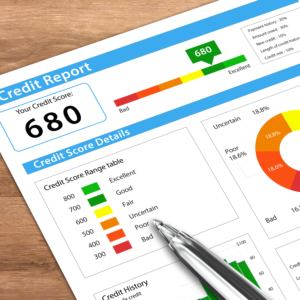When you’re considering the journey of homeownership, understanding your credit score is like having a compass guiding you through the process. Unfortunately, many only realize its significance when they’re knee-deep in mortgage discussions. Use these helpful tips to help you navigate the world of credit worthiness.
Unlocking the Power of Your Credit Score
Your credit score acts as a gatekeeper to favorable mortgage rates and greater purchasing potential. Scores range from 300 to 900, with higher scores opening doors to better deals. Ideally, aim for a score of 680 or above, especially if your down payment is less than 20%. However, if you can put down 20% or more, the score becomes slightly less critical.

The Anatomy of a Credit Score
Your credit score is a composite of various financial behaviors:
- Payment History: Timely bill payments are paramount to maintaining a positive credit history. Automating payments or setting up reminders can help ensure bills are paid on time, avoiding negative impacts on your score.
- Debt Level: Your credit utilization ratio, or the amount of credit you’re using compared to your credit limits, significantly influences your score. Keep balances low and aim to pay off high-interest debt first to improve your utilization ratio.
- Credit History Length: Lenders favor longer credit histories, as they provide a more comprehensive picture of your financial behavior. Avoid closing old accounts, as this can shorten your credit history and potentially lower your score.
- New Credit: Opening multiple new accounts within a short period can signal financial instability and lower your score. Be strategic about applying for credit and only open new accounts when necessary.
Building Your Credit Score: A Roadmap
Empower yourself with these strategies:
- Pay Your Bills: Timely, full payments are non-negotiable to demonstrate reliability. Consider setting up automatic payments or reminders to ensure bills are paid on time each month.
- Tackle Your Debts: Prioritize paying off smaller debts first to build momentum. Utilize the debt avalanche or debt snowball method to pay down debt strategically and reduce financial strain.
- Use Credit Wisely: Keep credit utilization below 70% to showcase responsible usage. Avoid maxing out credit cards and strive to pay balances in full each month to minimize interest charges (if you are really up for the challenge, try 50%!!!).
- Manage Applications: Limit the number of credit applications to minimize negative impacts on your score. Each credit inquiry can temporarily lower your score, so be selective about applying for new credit.
The Perils of Low Credit Scores
A low credit score can be akin to hitting a roadblock on your path to homeownership:
- Higher Interest Rates: Low scores often result in higher interest rates, translating to increased costs over time. Improving your credit score can lead to significant savings on mortgage interest.
- Limited Mortgage Options: Lenders may offer less favorable terms or deny your application altogether. Taking steps to improve your credit score can expand your mortgage options and increase your chances of approval.
- Stress and Uncertainty: Poor credit can lead to anxiety and uncertainty about your financial future. By taking control of your credit and implementing positive financial habits, you can reduce stress and build confidence in your ability to achieve homeownership.
The Path to Credit Redemption
The good news? You have the power to rebuild your credit:
- Start Today: Every positive action, no matter how small, contributes to improving your score over time. Set realistic goals and commit to making consistent progress towards achieving them.
- Monitor Your Progress: Regularly review your credit report for inaccuracies or signs of improvement. Monitoring your credit allows you to track your progress and identify areas for improvement.
- Seek Guidance: Don’t hesitate to seek personalized advice on improving your credit score. A financial advisor or credit counselor can provide valuable insights and strategies tailored to your unique situation.
Confidently Navigating Your Financial Future
Understanding the nuances of credit scoring empowers you to make informed decisions on your journey to homeownership. While low scores may present challenges, they are not insurmountable. By adopting responsible financial habits and seeking guidance when needed, you can pave the way to a brighter financial future.
You’re Not Alone
If you ever feel overwhelmed or unsure about your credit journey, remember that support is available. Feel free to contact me for personalized support and guidance tailored to your unique situation. Together, we can navigate the path to financial success.